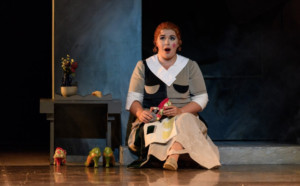Review: LA CENERENTOLA, Bristol Hippodrome

![]()
The original Italian premiere of Rossini's rags-to-riches opera was more morally pragmatic than magical: with a 'goodness triumphs' moral in its title ('La bontà in trionfo'), Roman Catholicism restricting an unclothed foot from appearing in the performance, and 19th-century theatrics making transformations impractical, the music was the magic.
The music is magical, with all its coloratura, patter, and character from the principals, male chorus and orchestra magnificently managed by Tomáš Hanus, but there's still some magic amiss in this staging from Welsh National Opera.
La Cenerentola falls away from the French fairy tale and into the Grimm's grotesque without a fairy godmother or midnight curfew, and Joan Font's staging fuels the fantasy with giant mice and the suggestion that it was all a sugarcoated fever dream danced in Joan Guillén's garish costumes.
The opera follows in the footsteps of the fairy tale with a prince, two ugly stepsisters, and a fate forever changed, yet there are also disguises, with the prince dressed up as his valet Dandini - a delightfully disgraceful Giorgio Caoduro - a pair of glittering accessories in place of glass slippers, and a deep-voiced philosopher (Wojtek Gierlach) as the fairy godmother, or godfather. The fairy tale is formative, but the magic is transformed into something less imaginative.
Even as opera is prescriptive, each act and moment choreographed to the music and imposed by the composer, the pacing feels inharmonious with the action, without a triumph or tragedy to comfortably part the two acts. As such, the dramatic tension is diminished, as this Cinderella is in attendance at the dance at the end of Act I, and without her exodus, there's little to entice us into Act II other than the melodic line.
The narrative isn't a weakness of Welsh National Opera, although a lot of nuances in the work are lost to its well-wigged and well-worn ornateness. The exuberant bravura of Ferretti's libretto feels like it battles, not balances, the elaborateness of the production design, although it's sung with bright, well-balanced brilliance.
Rossini is at his most rousing in the sotto voce sextet "Siete voi?", with the rolling r's and plosive p's impressively performed, and the voices of all roles resonating in an uneven evening for volume.
There are virtuoso oeuvres for all voices, and the soloists sing them with verve. Tara Erraught is gently angelic as the neglected Angelina (Cenerentola), her earlier arias glinting with longing and final forgiveness alight with gorgeous vocal flair.
Matteo Macchioni sings with impressive compassion in his Act II aria and has some charming comic moments as Cenerentola's Prince Charming masked as a pauper, and there's compelling support from Fabio Capitanucci's sputtering stepfather and Aoife Miskelly and Heather Lowe's pair of spiteful stepsisters.
With all its magic in the music, this Cenerentola is more a brightly coloured frolic than a transformative rags-to-riches fairytale.
Welsh National Opera's La Cenerentola continues on tour
Photo credit: Jane Hobson
Reader Reviews

Videos

